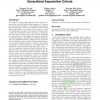Free Online Productivity Tools
i2Speak
i2Symbol
i2OCR
iTex2Img
iWeb2Print
iWeb2Shot
i2Type
iPdf2Split
iPdf2Merge
i2Bopomofo
i2Arabic
i2Style
i2Image
i2PDF
iLatex2Rtf
Sci2ools
122
click to vote
SIGIR
2008
ACM
2008
ACM
Learning from labeled features using generalized expectation criteria
It is difficult to apply machine learning to new domains because often we lack labeled problem instances. In this paper, we provide a solution to this problem that leverages domain knowledge in the form of affinities between input features and classes. For example, in a baseball vs. hockey text classification problem, even without any labeled data, we know that the presence of the word puck is a strong indicator of hockey. We refer to this type of domain knowledge as a labeled feature. In this paper, we propose a method for training discriminative probabilistic models with labeled features and unlabeled instances. Unlike previous approaches that use labeled features to create labeled pseudo-instances, we use labeled features directly to constrain the model's predictions on unlabeled instances. We express these soft constraints using generalized expectation (GE) criteria -terms in a parameter estimation objective function that express preferences on values of a model expectation. ...
Discriminative Probabilistic Models | Information Technology | Labeled Features | SIGIR 2008 | Text Classification |
Related Content
| Added | 15 Dec 2010 |
| Updated | 15 Dec 2010 |
| Type | Journal |
| Year | 2008 |
| Where | SIGIR |
| Authors | Gregory Druck, Gideon S. Mann, Andrew McCallum |
Comments (0)

